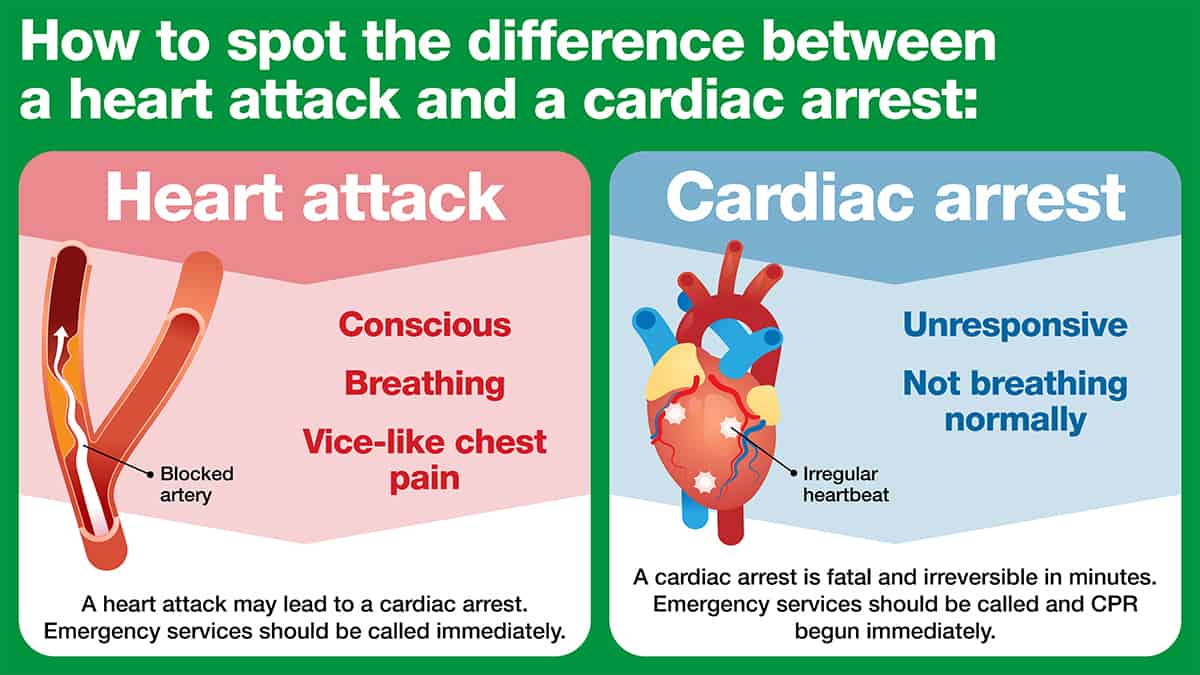
How common are heart attacks?
Each year in the UK 100,000 people are admitted to hospital with a heart attack. The good news is there are still 1.4 million heart attack survivors alive today, so it is treatable.
It can be difficult to tell a heart attack apart from other conditions which cause chest pain, and this means some people delay hospital treatment, putting themselves at serious risk. A heart attack is time-critical, and the sooner it’s treated the less likely it is to be fatal or cause serious damage to the hurt muscles. Understanding heart attacks and their usual symptoms is therefore crucial.
Is a heart attack the same as a cardiac arrest?
A heart attack and a cardiac arrest are not the same thing. This is a common misunderstanding. When experiencing a heart attack, the casualty will be conscious, breathing, and in pain, because the oxygen supply to their heart is restricted.
In a cardiac arrest, the heart is no longer beating normally due to abnormal or absent electrical activity – this means the person will be unresponsive and not breathing normally. A cardiac arrest is fatal, becomes irreversible in minutes and requires immediate CPR & urgent emergency medical treatment.
A heart attack may lead to a cardiac arrest, in which CPR should be administered, along with use of an AED when possible.

Read this blog for more information on cardiac arrests and how to respond.
What is a heart attack?
A heart attack (myocardial infarction) is when part of your heart muscle is starved of blood and oxygen, causing it to die. This usually happens because of fat deposits in the arteries: if a piece of this fatty material breaks off inside a coronary artery, a blood clot forms to try and repair the damage to the arterial wall. This can, in turn, block the coronary artery to the heart, limiting or stopping the supply of blood along with the oxygen it carries.This is why obesity, a poor diet and a lack of physical activity are major risk factors for heart attacks. Other risk factors include high blood pressure, smoking, excessive alcohol intake, high blood cholesterol and diabetes.
What are the symptoms of a heart attack?
Heart attack symptoms can vary, and not everyone will experience the common, and best-known, symptoms – this means not all heart attacks will cause serious chest pain. People can sometimes confuse a heart attack with indigestion. Nevertheless, here are the most common symptoms:- Crushing, vice-like chest pain or discomfort which appears suddenly and does not go away
- Pain may spread to the left or right arm or to the neck, jaw, stomach or back
- Breathlessness, a feeling of faintness or dizziness, sweating and nausea.
- Extreme anxiety (a sense of impending doom)
- Excessive wheezing or coughing.
- Is sudden
- Spreads to your neck, jaw, arms or back
- Feels tight or heavy
- Lasts over 15 minutes
What should you do if you suspect someone is having a heart attack?
If you suspect that you or someone else is suffering a heart attack, here’s what to do:- Obtain medical aid urgently, stating to ambulance control that it is chest pain
- Sit the casualty down, well supported with their knees up or a comfortable position
- Give casualty a 300mg aspirin, advise to chew slowly. Do not give aspirin if allergic to it
- Ask bystander to fetch an AED. Never leave a casualty alone in order to fetch an AED
- Reassure the casualty; don’t fuss
- Constantly monitor airway, breathing and circulation
- Be prepared to carry out CPR if necessary
- Place in the recovery position if they become unresponsive.
About the author:
Dennis Outram is a senior first aid trainer and a Serving Brother in the Order of St John.
Find out more about Dennis.

